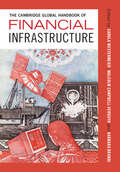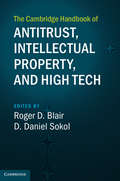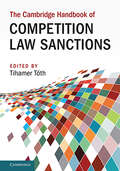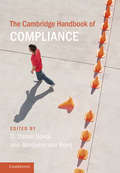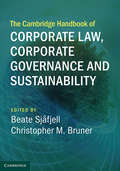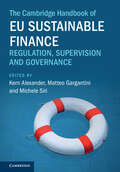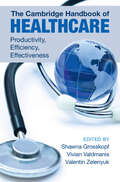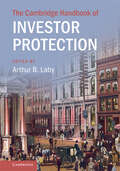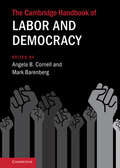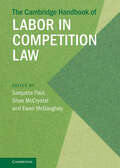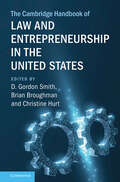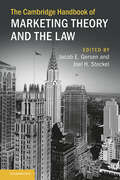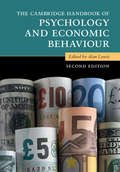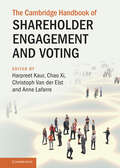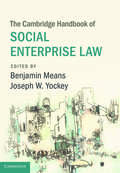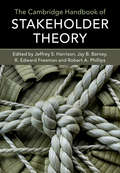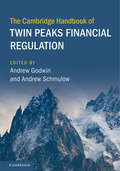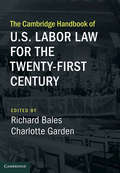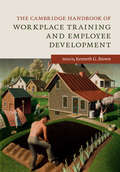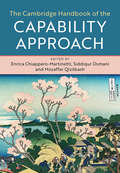- Table View
- List View
The Cambridge Economic History of Modern Europe, Volume 2: 1870 to the Present
by Kevin H. O'Rourke Stephen BroadberryUnlike most existing textbooks on the economic history of modern Europe, which offer a country-by-country approach, The Cambridge Economic History of Modern Europe rethinks Europe's economic history since 1700 as unified and pan-European, with the material organized by topic rather than by country. This second volume tracks Europe's economic history through three major phases since 1870. The first phase was an age of globalization and of European economic and political dominance that lasted until the First World War. The second, from 1914 to 1945, was one of war, deglobalization, and depression and the third was one of growing integration not only within Europe but also between Europe and the global economy. Leading authors offer comprehensive and accessible introductions to these patterns of globalization and deglobalization as well as to key themes in modern economic history such as economic growth, business cycles, sectoral developments, and population and living standards.
The Cambridge Global Handbook of Financial Infrastructure
by Malcolm Campbell-Verduyn Barbara Brandl Carola WestermeierFinancial infrastructures are the lifeblood of political economies and are consistently considered critical by governments. They encapsulate socio-technical processes; not merely cables and computer servers, but the relationship of those in finance to these and other physical objects. The Cambridge Global Handbook of Financial Infrastructure consolidates the study of financial infrastructures by bridging political economy, humanities, sociology and science and technology studies. It delves into the core questions of modern finance, from the effect of digitalization on financial functions to the intricate web of global power dynamics. Drawing together interdisciplinary research, it explores the nuances of inclusivity and exclusivity within financial systems, shedding light on historical inequalities and colonial legacies. Including fresh insights, compelling case studies, and conceptual advances, this essential volume offers invaluable perspectives for informing analysis of the past, present, future of finance, and shaping policy debates. This title is also available as Open Access on Cambridge Core.
The Cambridge Handbook of Antitrust, Intellectual Property, and High Tech
by Blair Sokol D. Daniel Roger D.This Cambridge Handbook, edited by Roger D. Blair and D. Daniel Sokol, brings together a group of world-renowned professors in the fields of law and economics to assess the theory and practice of antitrust, intellectual property, and high tech. With the increased globalization of antitrust, a better understanding of how law and economics shape this interface will help academics, policymakers, and practitioners to understand the existing state of academic literature, its limits, and its relevance to real-world antitrust. The book will be an essential resource for anyone seeking to understand academic and policy considerations shaping the world of antitrust, intellectual property, and high tech.
The Cambridge Handbook of Competition Law Sanctions (Cambridge Law Handbooks)
by Tihamer TóthThis handbook brings together an international roster of competition law scholars and practitioners to address the issue of sanctions in competition law from all angles. Covering nineteen jurisdictions around the world, the book analyzes the theoretical foundations and practice of sanctioning competition law infringements and, most importantly, cartels. Contributors include a range of experts drawing on criminal law, company law, labor law, human rights, and law and economics, to determine what sanctions are available as a matter of positive law against corporations and individuals, including fines and other criminal, administrative, and civil law sanctions; whether law enforcers are using these sanctions effectively; and if new sanctions – including individual sanctions – should be introduced.
The Cambridge Handbook of Compliance (Cambridge Law Handbooks)
by D. Daniel Sokol Benjamin Van RooijCompliance has become key to our contemporary markets, societies, and modes of governance across a variety of public and private domains. While this has stimulated a rich body of empirical and practical expertise on compliance, thus far, there has been no comprehensive understanding of what compliance is or how it influences various fields and sectors. The academic knowledge of compliance has remained siloed along different disciplinary domains, regulatory and legal spheres, and mechanisms and interventions. This handbook bridges these divides to provide the first one-stop overview of what compliance is, how we can best study it, and the core mechanisms that shape it. Written by leading experts, chapters offer perspectives from across law, regulatory studies, management science, criminology, economics, sociology, and psychology. This volume is the definitive and comprehensive account of compliance.
The Cambridge Handbook of Consumer Privacy
by Evan Selinger Jules Polonetsky Omer TeneBusinesses are rushing to collect personal data to fuel surging demand. Data enthusiasts claim personal information that's obtained from the commercial internet, including mobile platforms, social networks, cloud computing, and connected devices, will unlock path-breaking innovation, including advanced data security. By contrast, regulators and activists contend that corporate data practices too often disempower consumers by creating privacy harms and related problems. <P><P>As the Internet of Things matures and facial recognition, predictive analytics, big data, and wearable tracking grow in power, scale, and scope, a controversial ecosystem will exacerbate the acrimony over commercial data capture and analysis. The only productive way forward is to get a grip on the key problems right now and change the conversation. <P>That's exactly what Jules Polonetsky, Omer Tene, and Evan Selinger do. They bring together diverse views from leading academics, business leaders, and policymakers to discuss the opportunities and challenges of the new data economy.<P> Proposes a new view of the consumer privacy debates.<P> Provides an interdisciplinary account of consumer privacy issues that includes contributions from industry leaders, activists, and policymakers.<P> Offers new pathways forward to move us beyond the current consumer privacy impasses.<P>
The Cambridge Handbook of Consumer Psychology
by Michael I. Norton Derek D. Rucker Norton, Michael I. and Rucker, Derek D. and Lamberton, Cait Cait LambertonWhy do consumers make the purchases they do, and which ones make them truly happy? Why are consumers willing to spend huge sums of money to appear high status? This handbook addresses these key questions and many more. It provides a comprehensive overview of consumer psychology, examining cutting-edge research at the individual, interpersonal, and societal levels. Leading scholars summarize past and current findings and consider future lines of inquiry to deepen our understanding of the psychology behind consumers' decision making, their interactions with other consumers, and the effects of societal factors on consumption. The Cambridge Handbook of Consumer Psychology will act as a valuable guide for faculty as well as graduate and undergraduate students in psychology, marketing, management, sociology, and anthropology.
The Cambridge Handbook of Corporate Law, Corporate Governance and Sustainability (Cambridge Law Handbooks)
by Christopher M. Bruner Beate SjåfjellThe emerging field of corporate law, corporate governance and sustainability is one of the most dynamic and significant areas of law and policy in light of the convergence of environmental, social and economic crises that we face as a global society. Understanding the impact of the corporation on society and realizing its potential for contributing to sustainability is vital for the future of humanity. This Handbook comprehensively assesses the state-of-the-art in this field through in-depth discussion of sustainability-related problems, numerous case studies on regulatory responses implemented by jurisdictions around the world, and analyses of predominant strategies and potential drivers of change. This Handbook will be an essential reference for scholars, students, practitioners, policymakers, and general readers interested in how corporate law and governance have exacerbated global society's most pressing challenges, and how reforms to these fields can help us resolve those challenges and achieve sustainability.
The Cambridge Handbook of EU Sustainable Finance: Regulation, Supervision and Governance (Cambridge Law Handbooks)
by Kern Alexander Michele Siri Matteo GargantiniThis essential reference work explores the role of finance in delivering sustainability within and outside the European Union. With sustainability affecting core elements of company, banking and capital markets law, this handbook investigates the latest regulatory strategies for protecting the environment, delivering a fairer society and improving governance. Each chapter is written by a leading scholar who provides a solid theoretical approach to the topic while focussing on recent developments. Looking beyond the European Union, the book also covers relevant developments in the United States, the United Kingdom and other major jurisdictions. Thorough and comprehensive, this volume is a crucial resource for scholars, policymakers and practitioners who aim for a greener world, a more equitable society and better-managed corporations.
The Cambridge Handbook of Healthcare: Productivity, Efficiency, Effectiveness
by Shawna Grosskopf Vivian Valdmanis Valentin ZelenyukHealthcare is inextricably bound to productivity, efficiency, and economic development. Although many methods for analyzing productivity and efficiency have been extensively covered, relatively little focus has been placed on how those methods can be applied to health care in a coherent and comprehensive manner. The Cambridge Handbook of Healthcare outlines current foundations and states of the art on which future research can build. It brings together experts in this growing field to cover three key sources and aspects of human welfare – productivity, efficiency, and healthcare. Beginning with academic focused chapters, this book bridges and provides outreach to the practice and regulation of the health care industry and includes academic and regulatory perspectives, including overviews of major evidence from international empirical applications. Each chapter is dedicated to a particular topic and delivered by international experts on that topic.
The Cambridge Handbook of Investor Protection (Cambridge Law Handbooks)
by Arthur B. LabyThe topic of investor protection has occupied investors, businesses, regulators, academics, and courts since the 1930s. The topic exploded in importance after the 2008 financial crisis and the Bernard Madoff Ponzi scheme of the same year. Investor protection scholarship now seeks to respond to developments such as the institutionalization of the markets, the democratization of finance, and the enhanced role of market professionals and other gatekeepers. Additionally, although the philosophy of full disclosure remains the guiding principle behind the securities laws, recent research has questioned the merits of a disclosure-based regime. In light of these trends, regulators try to strike the right balance between imposing a strict investor protection regime, on the one hand, and giving businesses the freedom to innovate new projects, market new services, and reduce costs, on the other. The Cambridge Handbook of Investor Protection brings together leading scholars to inform this debate and fill a gap left by these developments.
The Cambridge Handbook of Labor and Democracy (Cambridge Law Handbooks)
by Angela B. Cornell Mark BarenbergWe are currently witnessing some of the greatest challenges to democratic regimes since the 1930s, with democratic institutions losing ground in numerous countries throughout the world. At the same time organized labor has been under assault worldwide, with steep declines in union density rates. In this timely handbook, scholars in law, political science, history, and sociology explore the role of organized labor and the working class in the historical construction of democracy. They analyze recent patterns of democratic erosion, examining its relationship to the political weakening of organized labor and, in several cases, the political alliances forged by workers in contexts of nationalist or populist political mobilization. The volume breaks new ground in providing cross-regional perspectives on labor and democracy in the United States, Europe, Latin America, Africa, and Asia. Beyond academia, this volume is essential reading for policymakers and practitioners concerned with the relationship between labor and democracy.
The Cambridge Handbook of Labor in Competition Law The Cambridge Handbook of Labor in Competition Law (Cambridge Law Handbooks)
by Shae McCrystal Ewan McGaughey Sanjukta PaulAs scholars and policymakers around the world seek a systematic approach to the question of 'gig work,' one of its regulatory dimensions – the intersection of labor and competition law – points toward a deeper reconceptualization of the conventional legal and economic categories typically brought to bear upon it. A comparative approach to the question of gig work further reveals the variety and contingency of background assumptions that are often overlooked in the context of domestic policy debates. By combining a detailed comparative doctrinal survey of the regulation of non-employee workers in domestic competition law systems with a set of essays reframing the underlying questions raised – in terms of international legal frameworks, freedom of association norms, alternative approaches to law and economics, and more – The Cambridge Handbook of Labor in Competition Law moves the debates over the fissured workplace and the labor – competition law intersection forward in novel ways.
The Cambridge Handbook of Law and Entrepreneurship in the United States (Cambridge Law Handbooks)
by D. Gordon Smith Brian J. Broughman Christine HurtLaw plays a key role in determining the level of entrepreneurial action in society. Legal rules seek to define property rights, facilitate private ordering, and impose liability for legal wrongs, thereby attempting to establish conditions under which individuals may act. These rules also channel the development of technology, regulate information flows, and determine parameters of competition. Depending on their structure and implementation, legal rules can also discourage individuals from acting. It is thus crucial to determine which legal rules and institutions best enable entrepreneurs, whose core function is to challenge incumbency. This volume assembles legal experts from diverse fields to examine the role of law in facilitating or impeding entrepreneurial action. Contributors explore issues arising in current policy debates, including the incentive effect of legal rules on startup activity; the role of law in promoting or foreclosing market entry; and the effect of entrepreneurial action on legal doctrine.
The Cambridge Handbook of Marketing and the Law (Cambridge Law Handbooks)
by Jacob E. Gersen Joel H. SteckelThis handbook examines a wide range of current legal and policy issues at the intersection of marketing and the law. Focusing on legal outcomes that depend on measurements and interpretations of consumer and firm behavior, the chapters explore how consumers form preferences, perceptions, and beliefs, and how marketers influence them. Specific questions include the following: How should trademark litigation be valued and patent damages assessed? What are the challenges in doing so? What divides certain marketing claims between fact and fiction? Can a litigant establish secondary meaning without a survey? How can one extract evidence on consumer behavior with the explosion of social media? This unique volume at the intersection of marketing and the law brings together an international roster of scholars to answer these questions and more.
The Cambridge Handbook of Meeting Science
by Allen, Joseph A. and Lehmann-Willenbrock, Nale and Rogelberg, Steven G. Joseph A. Allen Nale Lehmann-Willenbrock Steven G. RogelbergThis first volume to analyze the science of meetings offers a unique perspective on an integral part of contemporary work life. More than just a tool for improving individual and organizational effectiveness and well-being, meetings provide a window into the very essence of organizations and employees' experiences with the organization. The average employee attends at least three meetings per week and managers spend the majority of their time in meetings. Meetings can raise individuals, teams, and organizations to tremendous levels of achievement. However, they can also undermine effectiveness and well-being. The Cambridge Handbook of Meeting Science assembles leading authors in industrial and organizational psychology, management, marketing, organizational behavior, anthropology, sociology, and communication to explore the meeting itself, including pre-meeting activities and post-meeting activities. It provides a comprehensive overview of research in the field and will serve as an invaluable starting point for scholars who seek to understand and improve meetings.
The Cambridge Handbook of Psychology and Economic Behaviour
by Alan LewisPsychologists have been observing and interpreting economic behaviour for at least fifty years, and the last decade, in particular, has seen an escalated interest in the interface between psychology and economics. The Cambridge Handbook of Psychology and Economic Behaviour is a valuable reference resource dedicated to improving our understanding of the economic mind and economic behaviour. Employing empirical methods - including laboratory experiments, field experiments, observations, questionnaires and interviews - the Handbook covers aspects of theory and method, financial and consumer behaviour, the environment and biological perspectives. With contributions from distinguished scholars from a variety of countries and backgrounds, the Handbook is an important step forward in the improvement of communications between the disciplines of psychology and economics. It will appeal to academic researchers and graduates in economic psychology and behavioural economics.
The Cambridge Handbook of Psychology and Economic Behaviour (Cambridge Handbooks in Psychology)
by Alan LewisPsychologists have been observing and interpreting economic behaviour for at least fifty years, and the last decade, in particular, has seen an escalated interest in the interface between psychology and economics. The Cambridge Handbook of Psychology and Economic Behaviour is a valuable reference resource dedicated to improving our understanding of the economic mind and economic behaviour. Employing empirical methods - including laboratory experiments, field experiments, observations, questionnaires and interviews - the Handbook covers aspects of theory and method, financial and consumer behaviour, the environment, and biological perspectives. With contributions from distinguished scholars from a variety of countries and backgrounds, the Handbook is an important step forward in the improvement of communications between the disciplines of psychology and economics. It will appeal to academic researchers and graduates in economic psychology and behavioural economics.
The Cambridge Handbook of Shareholder Engagement and Voting (Cambridge Law Handbooks)
by Chao Xi Harpreet Kaur Van der Elst, Christoph Anne LafarreAll over the world, companies play an important role in the economy. Different types of stakeholders hold the reins in these companies. An important class are the shareholders that finance the activities of these companies. In return, stakeholders have a say on how these companies should be organized and structure their activities. This is primarily done through voting and engaging. These mechanisms of voting and engaging allow the shareholders to decide significant aspects of the company structure, from who governs it to how much directors are paid. However, how shareholders vote and engage and how far their rights stretch are organized differently in different countries. This pioneering book provides insights into what rights these shareholders have and how the shareholders of companies in nineteen different jurisdictions participate in corporate life through voting and engaging. Comparative and international in scope, it pays particular attention to how jurisdictions align and differ around the world.
The Cambridge Handbook of Social Enterprise Law
by Benjamin Means Joseph W. YockeyGrowing numbers of employees, consumers, and investors want companies to be truly good; these stakeholders will accept lower economic returns in order to support companies that prioritize sustainability, fair wages, and fair trade. Unlike charities or non-profit organizations, such companies - or social enterprises - are not only permitted but also expected to produce an economic return for investors. Yet, unlike traditional business ventures, social enterprises have no obligation to maximize profits, even on a long-term basis. In this comprehensive volume, Benjamin Means and Joseph W. Yockey bring together leading legal scholars and practitioners to offer an authoritative guide to social enterprise law and policy. The Cambridge Handbook of Social Enterprise Law takes stock of the field and charts a course for its future development. It should be read by entrepreneurs, investors, practitioners, academics, students and anyone else interested in how companies are evolving to address new demands for capitalism with a conscience.
The Cambridge Handbook of Stakeholder Theory
by R. Edward Freeman Jeffrey S. Harrison Jay B. Barney Robert A. PhillipsIn the decades since R. Edward Freeman first introduced stakeholder theory, which views firms in terms of their relationships to a broad set of partners, the stakeholder approach has drawn increasing attention as a model for ethical business. Edited by Freeman, alongside other leading scholars in stakeholder theory and strategic management, this handbook provides a comprehensive foundation for study in the field, with eighteen chapters covering some of the most important topics in stakeholder theory written by respected and highly cited experts. The chapters contain an overview of the topic, an examination of the most important research on the topic to date, an evaluation of that research, and suggestions for future directions. Given the pace of new scholarship in the field, this handbook will provide an essential reference on both foundational topics as well as new applications of stakeholder theory to entrepreneurship, sustainable business, corporate responsibility, and beyond.
The Cambridge Handbook of Twin Peaks Financial Regulation (Cambridge Law Handbooks)
by Andrew Godwin Andrew SchmulowFirst proposed in 1994, the Twin Peaks model of financial system regulation employs two specialist peak regulators: one charged with the maintenance of financial system stability, and the other with market conduct and consumer protection. This volume, with contributions from over thirty scholars and senior regulators, provides an in-depth analysis of the similarities and differences in the Twin Peaks regimes that have been adopted around the world. Chapters examine the strengths and weaknesses of the model, provide lessons from Australia (the first to adopt the model), and offer a comparative look at the potential suitability of the model in leading non-Twin Peaks jurisdictions. A key resource for central bankers, public policy analysts, lawyers, economists, politicians, academics and students, this work provides readers with a comprehensive understanding of the Twin Peaks model, and a roadmap for countries considering its adoption.
The Cambridge Handbook of U.S. Labor Law for the Twenty-First Century (Cambridge Law Handbooks)
by Richard Bales Charlotte GardenOver the last fifty years in the United States, unions have been in deep decline, while income and wealth inequality have grown. In this timely work, editors Richard Bales and Charlotte Garden - with a roster of thirty-five leading labor scholars - analyze these trends and show how they are linked. Designed to appeal to those being introduced to the field as well as experts seeking new insights, this book demonstrates how federal labor law is failing today's workers and disempowering unions; how union jobs pay better than nonunion jobs and help to increase the wages of even nonunion workers; and how, when union jobs vanish, the wage premium also vanishes. At the same time, the book offers a range of solutions, from the radical, such as a complete overhaul of federal labor law, to the incremental, including reforms that could be undertaken by federal agencies on their own.
The Cambridge Handbook of Workplace Training and Employee Development (Cambridge Handbooks in Psychology)
by Brown Kenneth G.With comprehensive coverage of topics related to learning, training, and development, this volume is a must-have resource for industrial and organizational (I/O) psychologists, human resource (HR) scholars, and adult education specialists. Brown provides a forward-looking exploration of the current research on workplace training, employee development, and organizational learning from the primary point of view of industrial organizational psychology. Each chapter discusses current practices, recent research, and, importantly, the gaps between the two. In analyzing these aspects of the topic, the chapter authors both present the valuable knowledge available and show the opportunities for further study and practice.
The Cambridge Handbook of the Capability Approach
by Enrica Chiappero-Martinetti Mozaffar Qizilbash Siddiqur OsmaniThis landmark handbook collects in a single volume the current state of cutting-edge research on the capability approach. It includes a comprehensive introduction to the approach as well as new research from leading scholars in this increasingly influential multi-disciplinary field, including the pioneers of capability research, Martha C. Nussbaum and Amartya Sen. Incorporating both approachable introductory chapters and more in-depth analysis relating to the central philosophical, conceptual and theoretical issues of capability research, this handbook also includes analytical and measurement tools, as well as policy approaches which have emerged in the recent literature. The handbook will be an invaluable resource for students approaching the capability approach for the first time as well as for researchers engaged in advanced research in a wide range of disciplines, including development studies, economics, gender studies, political science and political philosophy.

